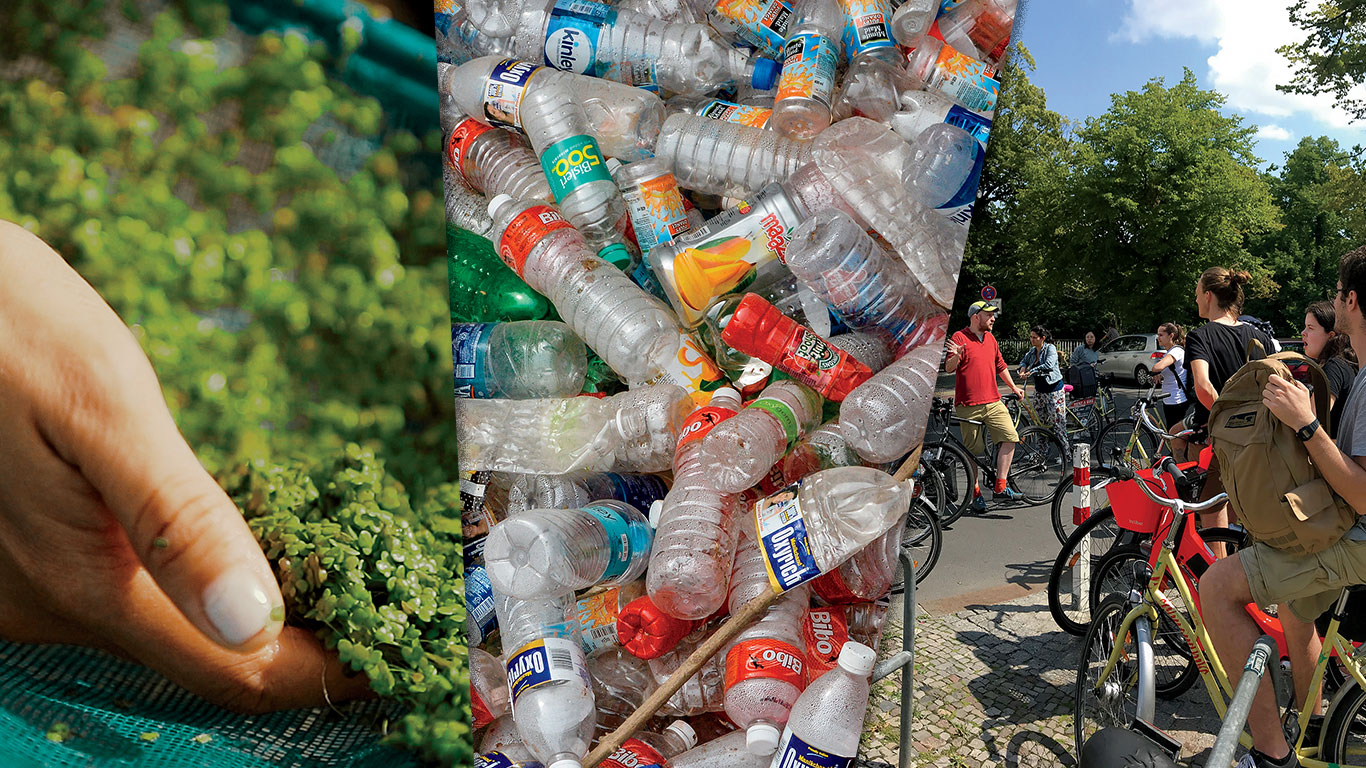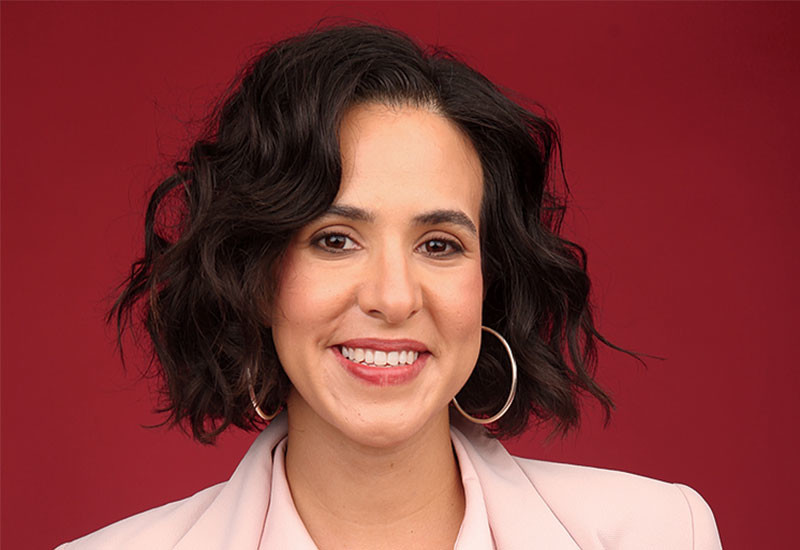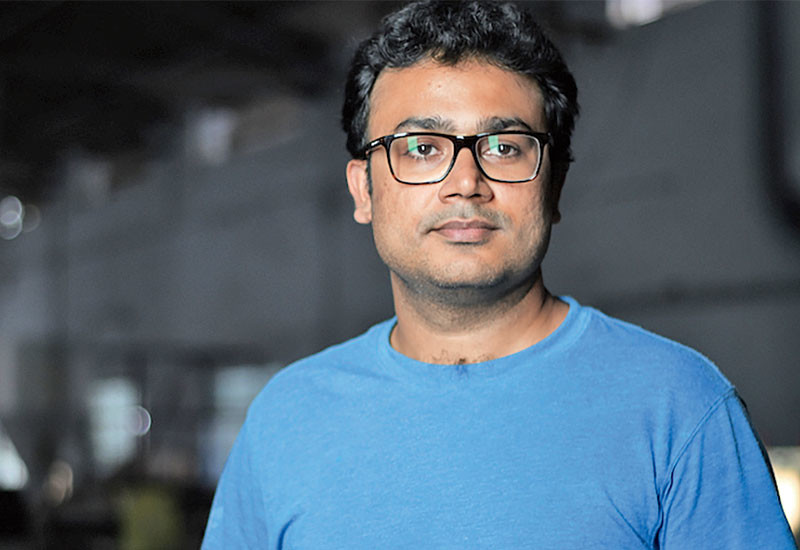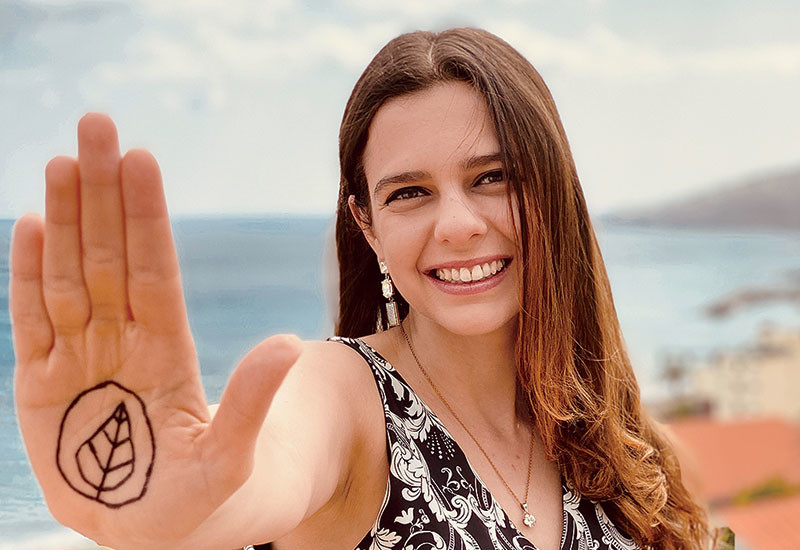
The Water Warrior
Marissa Cuevas Flores ’18SPS doesn’t like throwing things away.
“Because there is no away,” she says. “Everything has to go somewhere, so everything becomes waste. Unless we figure out a way to use it again.”
Cuevas has made it her mission to do exactly that. But rather than focusing on the trash in our cans and dumpsters, she is finding ways to recycle the byproducts from Mexico’s robust freshwater-fishing industry.
Cuevas’s company, microTERRA, grows an aquatic plant called lemna on private fish farms. The lemna uses the nitrogen and phosphorus in the fish waste as fertilizer, cleaning the water as it grows. This not only allows the farms to reuse their water, it also results in a plant that is high in protein and can be processed and used in the food industry.
“We need new sources of sustainable protein, and this is a way to do it while also salvaging two-thirds of the water that a fish farmer uses every day,” Cuevas says. “It’s truly a win-win.”
Cuevas has long used science as a tool to understand the world. She grew up in Mexico City as the daughter of two chemists, and she says that “science experiments were our idea of family fun.” After training as an engineer in Germany, Cuevas returned to Mexico, where she worked for a renewable-energy agency.
“People in the office used to get takeout for lunch every day, and the food would come in Styrofoam containers, which of course ended up in the trash,” Cuevas says. “I started to think about what we could do with the Styrofoam to make it reusable.”
Cuevas founded Kitcel, a startup that set out to turn Styrofoam into wood varnish. The venture was short-lived — as a novice entrepreneur, Cuevas had trouble raising sufficient funds to grow the company — but she says she learned a great deal about running a business, and particularly about models of a “circular economy,” the concept of using the waste from one industry as the starting product for another.
With the goal of founding another such company, Cuevas enrolled in Columbia’s master’s program in sustainability management. During the summer after her first year, Cuevas also participated in a three-month leadership training in Silicon Valley. Cuevas says that two lectures there were instrumental in shaping microTERRA.
“The first was about the potential of biotechnology and synthetic biology to solve major environmental problems,” she says. “And the second was about the UN’s forecast that our next world war will be over water. That absolutely stopped me in my tracks.”
Cuevas returned to Columbia energized about finding a more sustainable way to use water in farming and animal husbandry. “Seventy percent of the world’s fresh water goes into agriculture,” she says. “So it’s vital that we preserve as much as we can.”
The flexibility of the program, which is jointly administered by the Earth Institute, allowed her to take classes at the engineering and business schools, which helped her hone her ideas and create a compelling business plan. After winning the Greater Good Challenge — the School of Professional Studies’ business-pitch competition — as well as grants from the Tamer Fund, Echoing Green, and National Geographic, Cuevas returned to Mexico City to start her venture.
MicroTERRA initially focused on using microalgae that would filter the water in fish farms and double as food that the fish could eat, but the company struggled to find farmers willing to buy the product. It pivoted to using lemna, also known as duckweed, a plant that grows on the water’s surface and doubles every thirty-six hours, while cleaning the water at the same time. With a 35 to 42 percent protein content, lemna also had the potential to be a key ingredient in sustainable plant-based meat alternatives.
“But it was still difficult to convince farmers to take on the risk, even with clear environmental benefits,” Cuevas says.
By this time, the COVID-19 pandemic had hit, and Cuevas spent much of the lockdown staying in an Airbnb. Inspired by the sharing economy, she revisited her business model. She decided that instead of selling the product to farmers, microTERRA would rent the surface of their freshwater ponds. The farmers would benefit from both the income and the cleansing properties of the lemna, and microTERRA would be able to grow and resell lemna without using any additional water or other resources.
MicroTERRA piloted the idea with one farm in January 2021 and quickly expanded to two more. Initally, the company mostly sold the processed lemna to pet-food companies, though it is now pivoting to work with chefs and plant-based-food producers.
“We’re tackling two problems at once,” Cuevas says. “We’re turning a residue into a resource.”
The Recycling Reformer
Mani Vajipey ’13BUS had a successful career at Qualcomm, developing software for the iPhone and iPad, when he decided to trade it all in — for trash. Now, eight years later, his company, Banyan Nation, is revolutionizing the recycling industry in India, providing ethical and sustainable solutions to waste management. “I am the garbage guy,” says Vajipey with great enthusiasm. “It’s become an obsession.”
Vajipey, who grew up in a small town near Hyderabad, found his calling unexpectedly. He trained as an engineer in India and came to the United States in 2002 to earn a PhD at the University of Delaware. After completing a summer internship at Qualcomm, in California, he ended up staying at the company, building a lucrative career in telecommunications. But he wanted to do something more. “I was never much for the rat race,” he says. “I started thinking: what else? Where could I make the most impact?”
At the urging of his mentors at Qualcomm, Vajipey took a year’s sabbatical and traveled to India to learn more about some of the pressing problems in the developing world, then applied to Columbia Business School with the intention of finding solutions. “My heart was in the right place, but I was all over the map — thinking about health care, about education. I needed focus.”
He found it in an entrepreneurial-finance class during a guest lecture by Ron Gonen ’04BUS. Gonen, who had created Recyclebank, a rewards program for recycling, and also overseen New York City’s recycling program, inspired Vajipey to start thinking about garbage, specifically about the piles of trash on India’s streets. When he started to research, he realized the system was ripe for reinvention.
“In some ways, it’s a very efficient system. India recovers and recycles more plastics than any other developing economy,” Vajipey explains. “But because the government does not regulate trash collection, everything is mixed together and left on street corners. Poor people collect the plastics and resell them to local vendors, who then sell to private recycling centers. That supply chain is a few billion people strong.”
But despite the volume of plastic being collected, Vajipey learned that much of it was being wasted. Major corporations were reluctant to buy recycled plastic, because materials were not always properly sorted and the quality of the processing was inconsistent. “Back-channel recyclers bend and burn plastics in order to identify the resins within them, creating inconsistent and poor-quality materials,” says Vajipey. “There’s no accountability — the system is informal, illegal, and largely invisible. But I started to wonder how we could harness the power of all those people.”
Vajipey tackled the supply chain first. Teaming up with a former classmate from the University of Delaware, he developed an app to map Hyderabad’s 1,500 stationary recycling centers. From there, he was able to mine crucial data about how much waste was being produced and how it was being collected and transported. He then drew on his engineering background to devise a recycling system that ensures proper sorting and a high-quality end product. Banyan Nation is now able to produce recycled plastic granules that are extremely close to virgin plastics.
Rather than relying on a black-market system, Banyan Nation employs the same people to collect and sort waste, ensuring an ethical supply chain and also providing job security for hundreds of people in Hyderabad. Since it is able to vouch for both the supply chain and the end product, Banyan Nation has secured contracts with major corporations like Reckitt and Unilever.
“If you understand the problem well and deep enough, then the solutions follow,” Vajipey says. “And when the solutions follow, the money follows.”
Since Vajipey founded the company, in 2013, Banyan Nation has recycled over two thousand tons of plastic. In the past year alone, partner companies have manufactured over a hundred million bottles from Banyan Nation plastic for use in packaging shampoos and other cosmetic goods. But he says this is just the beginning. “Right now, it’s a luxury for companies to be able to use recycled plastics,” he says. “We want to make it so that it’s the norm. First in India, and then around the world.”
Vajipey says that he named the company after India’s national tree, the banyan, a large shade tree where villagers would traditionally gather to discuss important matters. “Waste management isn’t glamorous, but it’s an urgent problem for the environment and for developing economies,” he says. “I wanted for us to come together under the same tree and figure out a way to fix it.”
The Climate Connector
When Cassia Moraes ’15SIPA graduated from college with a degree in international relations, she knew she wanted to find a job that would allow her to work on the climate crisis. But despite major growth in the sustainability sector, she found it hard to land a position where she felt that she could make a difference.
“Like many people of my generation, I believe passionately that climate change is the biggest global challenge that we’re going to face this century,” Moraes says. “But I couldn’t find a place to direct that passion.”
Moraes, who is Brazilian, hopes that she can change that for others. She is a cofounder of Youth Climate Leaders (YCL), an organization that trains young people for careers in climate and sustainability and connects them to a global network of people working in those sectors. YCL’s two major educational programs are a seven-week general course on climate change and a two-week intensive course on a specific environmental issue; YCL also offers customized trainings for schools and organizations. After completing their coursework, participants are given access to mentorship programs, career-development webinars, online networks, and a job board with postings from partner organizations in relevant fields. YCL also hosts lectures, meetings, and other activities through regional YCL hubs and sends delegates to major global events, like the United Nations Climate Change Conference and Climate Week NYC.
“It’s both a network and a credential,” Moraes says. “Our partners feel good about hiring someone who has participated in the program, because they know that the applicant has had some training and is committed to the cause.”
Moraes’s own career path was circuitous, despite her best intentions. After college, she ended up working for a bank in São Paulo, where she hoped to focus on corporate responsibility. Instead she was ushered into the finance department, thanks to her international-relations experience and English skills. Still dedicated to pursuing a career in environmental policy, Moraes spent her free time on relevant volunteer projects, which eventually led to a three-month position with the Brazilian mission to the United Nations. While there, she was accepted to SIPA.
“Columbia was a real turning point in my career,” Moraes says. While studying for her master’s with “inspirational” professors like Jeffrey Sachs, Moraes completed a research project on the impact of climate change on small farmers in Brazil and also interned at the UN. After graduating, she worked on environmental policy at an NGO in New York before returning to Brazil.
But even with her experience, Moraes again found that she had a hard time securing opportunities in Brazil. Inspired to change that, she teamed up with three other Brazilian women working in similar fields to start developing the first version of YCL’s curriculum. In January of 2018, they entered their business idea in a contest through MIT’s Climate CoLab and won, which helped them to officially launch the company. In the summer of that year, they held their first immersion courses, and by the fall they had implemented the general courses and started the São Paulo YCL hub.
When the COVID-19 pandemic struck, in the spring of 2020, YCL faced several unforeseen challenges. But Moraes says that they were able not only to overcome them but to thrive despite (and perhaps even because of) them. They pivoted from mostly in-person courses to entirely virtual lessons, which Moraes says has allowed them to immediately expand their reach beyond Brazil. Today coursework is offered in all Portuguese-speaking countries, and soon it will be offered globally in English.
“It was a difficult time to be making partnerships, when so many companies had hiring freezes, but I’m proud that we were actually able to grow our company during the pandemic,” Moraes says. “Climate change didn’t stop because there was another immediate crisis, and so it was more important than ever to keep people engaged.”
Last year, YCL trained over five hundred people across twenty countries, and more than 90 percent of them are either working in the field or continuing their studies. Moraes says that they hope to increase those numbers, with a target of eight thousand students and 750 partner organizations by the end of 2022.
“There are so many young people out there who have the energy and focus to fight the climate crisis,” Moraes says. “We’re just helping to point them in the right direction.”
This article appears in the Fall 2021 print edition of Columbia Magazine with the title "Eco-Innovators."





